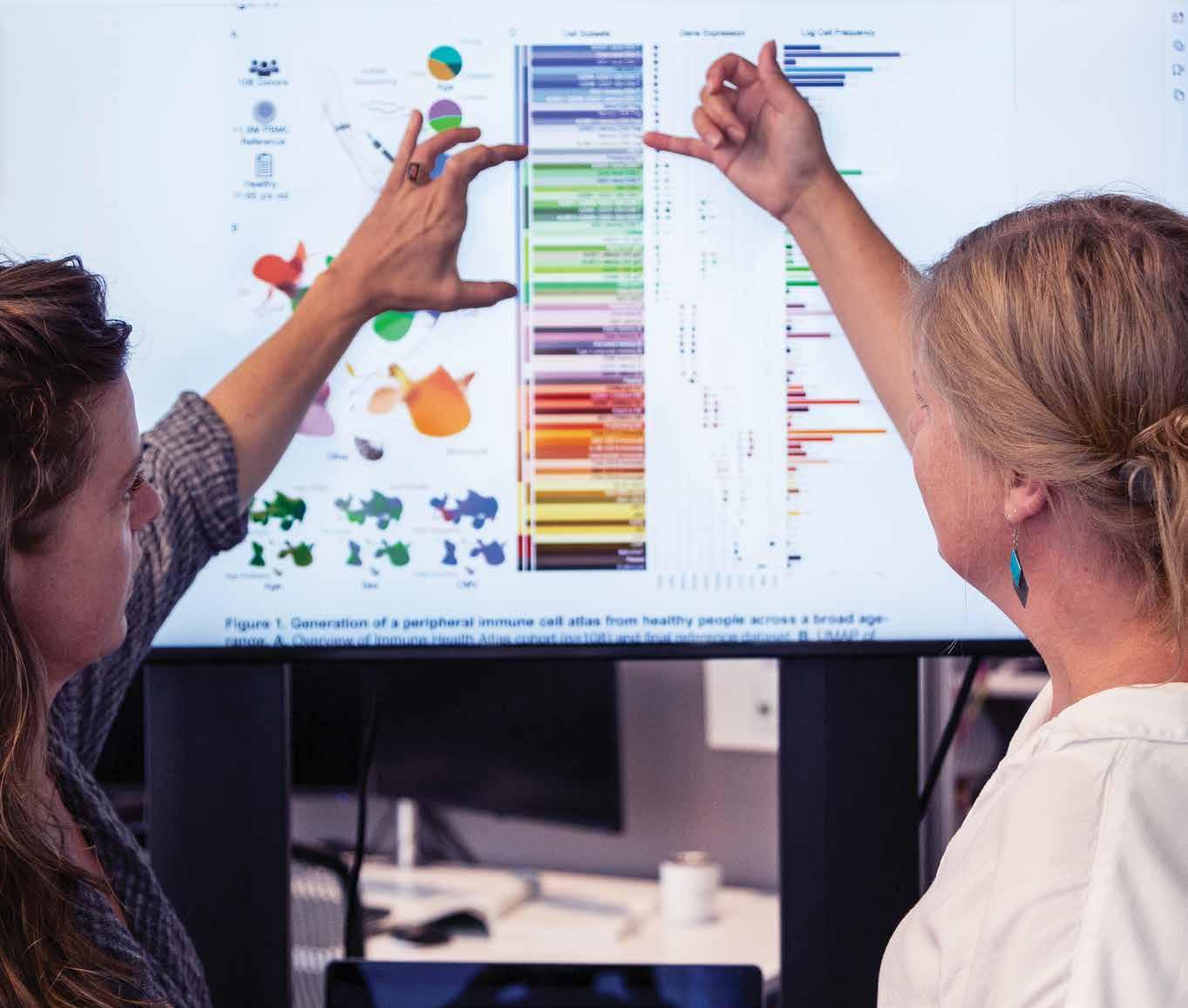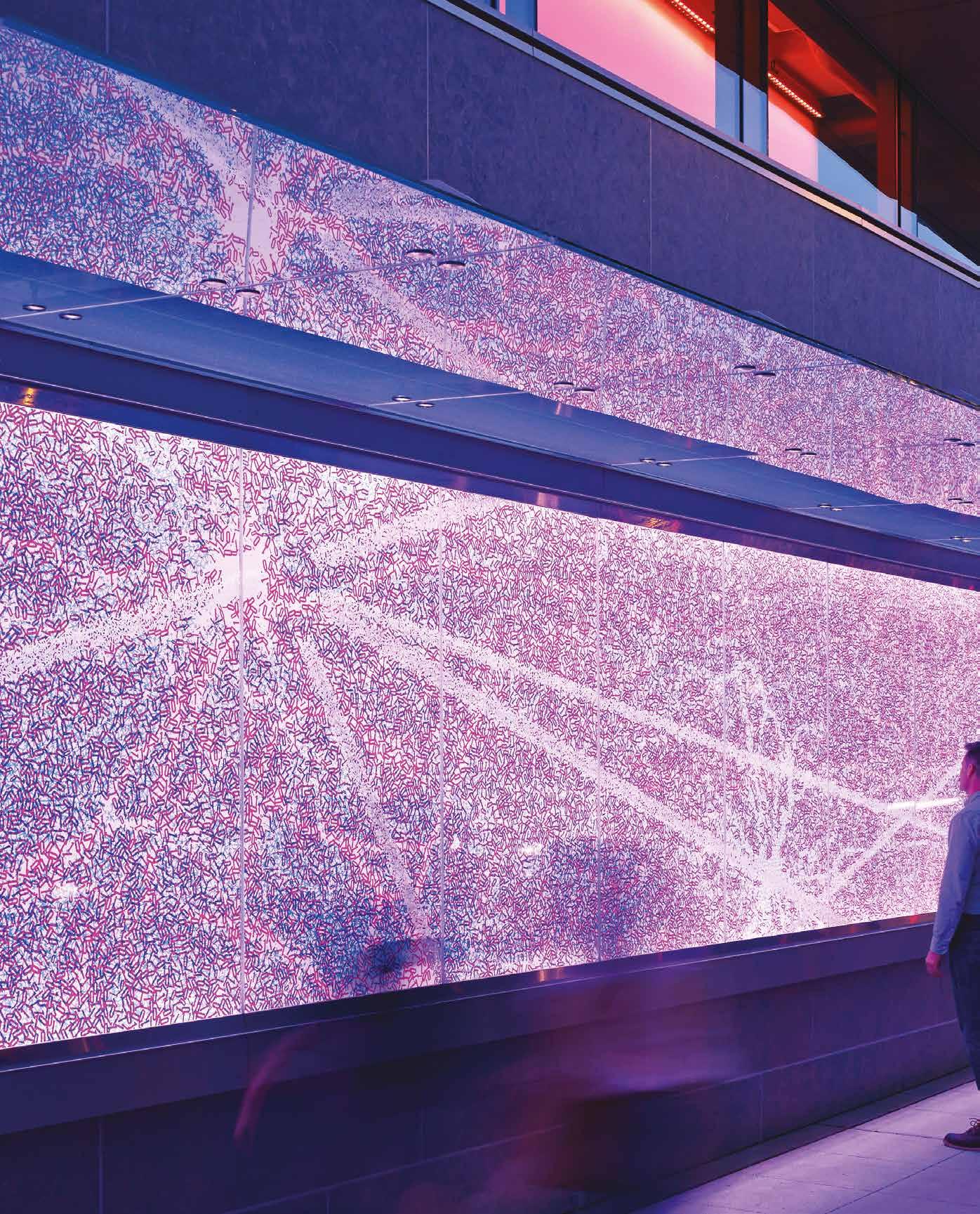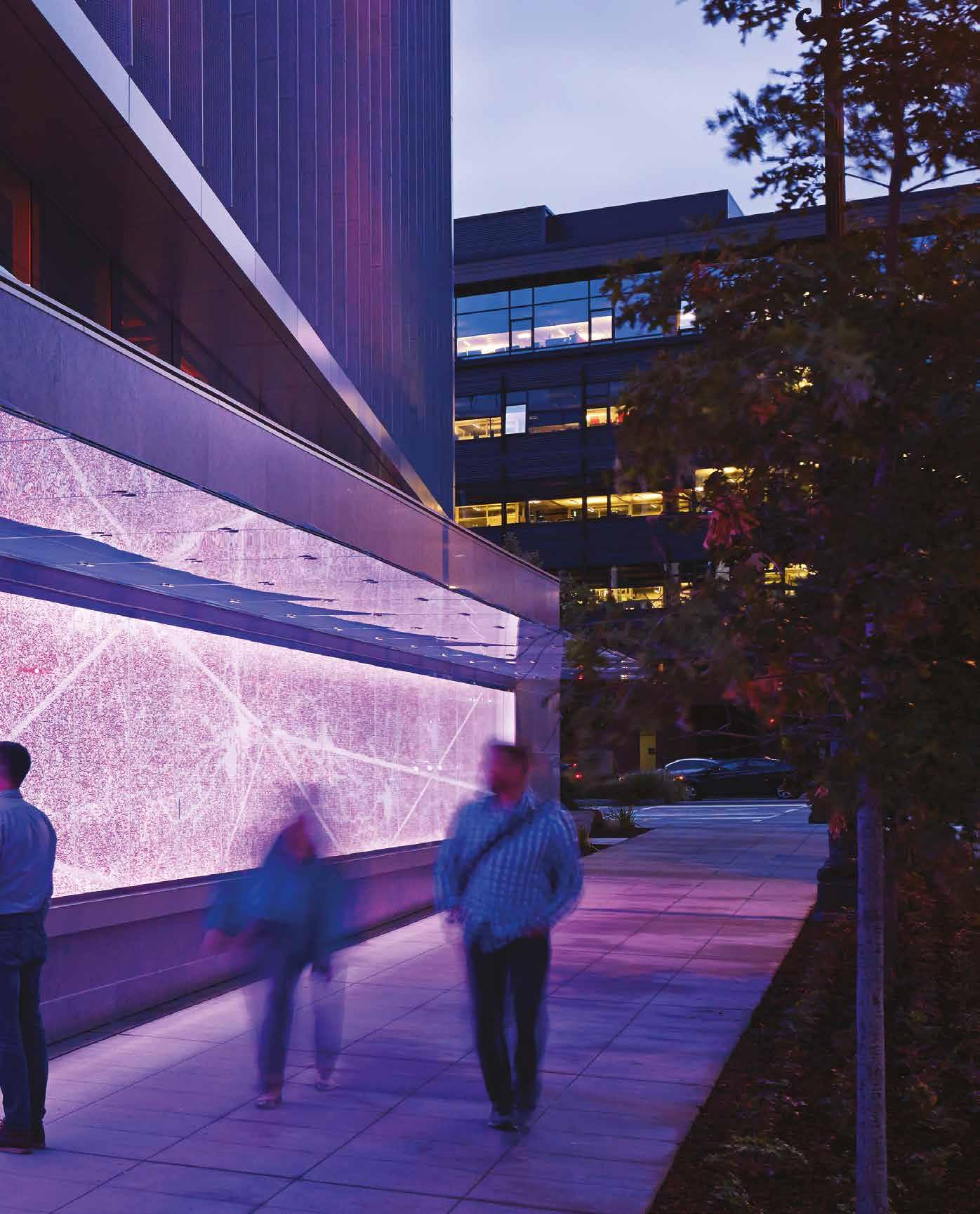

understanding life advancing health
At the Allen Institute, understanding life and advancing health is more than just a slogan, it’s the heartbeat of what we do.
We tackle the big foundational questions in life sciences by building creative and interdisciplinary teams that aim to answer them with complete, accurate, and permanent knowledge. To achieve exponential impact in our research, we openly share our data, tools, and knowledge with the world. Big science, team science, and open science have been our bedrock for more than 20 years of discovery, transforming our understanding of life and advancing health.
We live in a rapidly changing world, and we face incredible challenges: the impact of climate change on life, global pandemics, mental health, and aging, just to name a few. While these are all daunting, we know that our approach to science, collaboration, and the sharing of knowledge can make a difference.
As we start to address these challenges with new techniques and technologies, we enter an era where biological data is unprecedented in complexity and size. Artificial intelligence and data-driven discovery will help us crack some of the most vexing bioscience mysteries. Similarly, synthetic biology will give us new ways to record what happens inside living cells, and eventually intervene when people become ill. Finally, technologies we first invented to study the brain are now being used to deliver gene therapies to specific cells not only in the central nervous system, but anywhere in the body, giving new hope to patients living with presently incurable diseases.
As the Allen Institute charts this new course of scientific discovery, we know that the success of our journey will be determined by the creativity, ingenuity, and tenacity of those who join the voyage. Like the pioneering explorers who came before us, together we can go farther and have even greater impact.
Join Us
Rui Costa, D.V.M., Ph.D. President & Chief Executive Officer, Allen Institute


“The Allen Institute’s approach to team and open science helps tackle complex biomedical problems and enhances our understanding of the world around us. This kind of pioneering work not only advances science understanding, but also paves the way for transformative improvements in human health and our ability to tackle significant diseases that affect people and their families.”
Paul Nurse OM CH FRS Chief Executive Officer and Director, The Francis Crick Institute
Allen Institute Approach
decoding the complexities of life
bigscience
At the Allen Institute we tackle large-scale, ambitious projects in the life sciences aimed at answering big foundational questions. We create knowledge that provides solutions to some of these problems. Answering big questions requires big teams of researchers working together on big goals.
openscience
The Allen Institute openly and freely shares its data, tools, and resources with the world to accelerate scientific discovery. From scientists, to doctors, to students, serving the research community is at the center of our mission to expand our understanding of human health and disease.
teamscience
Our multidisciplinary teams bring diverse perspectives to the scientific challenges we face. You’ll find neuroscientists, cell biologists, mathematicians, physicists, engineers, immunologists, geneticists, informatics experts, and a team of administrative professionals working side-by-side to achieve our goals. We also collaborate with researchers around the globe, harnessing the expertise and knowledge of many to solve problems and deliver solutions.
impact
Building foundations and breaking boundaries in brain, cell, and immune system research, we’re empowering scientists worldwide to pursue bold solutions to humanity’s most pressing challenges. Our Allen Brain Map, Cell Explorer, and Human Immune System Explorer provide unprecedented insights into human biology. Our education resources inspire future scientists and we’re accelerating discoveries that improve lives and transform research from labs to classrooms.


science that shapes our future
The Education & Engagement Program drives transformative change in science education by connecting diverse communities with cutting-edge open science resources and research.
Through our pioneering Teacher Academy, we bring together educators from across the nation, immersing them in hands-on experiences with our comprehensive resources and expert staff. These educators emerge equipped to incorporate open science resources and practices into their teaching, empowering students to engage in authentic research experiences and develop crucial scientific skills while lowering barriers to access.
Our field trip initiative further amplifies this impact, welcoming students and community groups into the Institute, providing direct exposure to groundbreaking research and inspiring future generations of scientists.
“The Allen Institute resources have empowered my students to ask real research questions with real data collected by real scientists. It has revolutionized the kinds of discussions we can have in class and the kinds of projects my students can execute.”
Ashley Juavinett Associate Teaching Professor, UCSD

“Basic science lays the groundwork for breakthroughs, and the Allen Institute shares our commitment to its transformative potential. I’m honored to join the Impact Council to collaborate and drive discoveries that improve lives.”
Dr. Priscilla Chan Impact Council
Co-founder and Co-CEO, Chan Zuckerberg Initiative

what makes us human?
Our teams in Brain Science are unlocking fundamental insights into the human brain’s structure, function, and development, paving the way for profound advances in understanding neurological health and disease. For more than 20 years, the Institute has generated invaluable data, knowledge, and tools, openly shared to empower scientific minds worldwide.
Through sophisticated molecular analysis and advanced imaging technologies, our teams explore the mammalian brain’s cellular makeup, connectivity, and development with unprecedented precision. By cataloging and genetically profiling brain cell types, we’re advancing our fundamental understanding of brain evolution and disease mechanisms.
Our Allen Brain Map is the world’s most comprehensive and accessible data portal. Having sparked a revolution in neuroscience, this pioneering open science approach continues to transform our understanding of neurological disorders.
from lab to life – Alzheimer’s
We’re investigating how Alzheimer’s disease starts and progresses so we can develop ways to stop it.
Cell by cell, through initiatives such as the Seattle Alzheimer’s Disease (SEA-AD) Brain Cell Atlas consortium, our scientists are building a high-resolution map of brain changes in Alzheimer’s. This groundbreaking effort is fueling our understanding of the cellular and molecular changes that underlie the disease.
Our data and resources are openly available to the scientific community, accelerating progress towards developing better therapies to slow or halt Alzheimer’s progression and, one day, discover a cure.


how do living cells hold the secret to transforming human health?
By exploring how cells – the foundational building blocks of our bodies – operate in both healthy and diseased states, our Cell Science team is empowering scientific and medical communities worldwide. Understanding how cells grow and develop will help us predict what they’ll do next, which is key to improving human health.
Through these insights into cellular function, we are accelerating the pace of scientific discovery and creating a foundation for transformative advances in medicine, agriculture, and biotechnology that will benefit humanity for generations to come.
Our team has engineered 58 unique cell lines that target 44 critical biological structures, and developed 8 comprehensive disease collections for research – all openly accessible. Scientists across the globe leverage this powerful resource to decode cellular mechanisms underlying kidney disease, heart failure, and rare visual disorders – advancing our collective understanding of these challenging conditions.
from lab to life – heart disease
Hypertrophic cardiomyopathy (HCM) is a common genetic heart condition that can lead to sudden cardiac-related death in young people. Despite affecting 1 in 500 people, treatment options are limited to managing symptoms rather than addressing underlying causes.
Scientists at the Allen Institute have now created detailed maps of heart cell behavior. Openly available at the Allen Cell Collection, this is enabling researchers to study the impact of different mutations associated with the disease – before symptoms even appear, accelerating research towards more effective treatments and therapies for this life-threatening condition.

“The more scientists that take innovative approaches to try to understand disease, the more likely it is that we’re going to find those drug targets and develop drugs that will be effective.”
C.
Dirk Keene, M.D., Ph.D. Professor and Nancy and Buster Alvord Endowed Chair of Neuropathology, University of Washington Medicine

Immunology
what can our immune system teach us about living healthier lives?
Our Immunology team is defining the healthy human immune system, its natural variations, and what goes wrong in disease, all with the goal of improving human health.
Through investigations into COVID-19, cancer, inflammatory bowel disease, rheumatoid arthritis, and more, we’re illuminating the immune system’s vast complexities and advancing our fundamental understanding of how excessive or impaired immune responses drive disease.
This comprehensive approach holds the potential to transform how we prevent and diagnose immune-related diseases, as well as revolutionize patient care.
from lab to life – cancer
When they’re working optimally, our immune systems regularly detect and eliminate pre-cancerous cells. But cancer has many ways to evade and subvert normal immune responses and sometimes slips past these many-layered control systems.
Researchers at the Allen Institute are working to uncover the immunological malfunctions that underlie multiple myeloma and melanoma. By unmasking how cancer begins in the human body, we can identify points of intervention and ways to treat this disease.


Neural Dynamics
how does our brain turn experience into action?
Neural Dynamics explores brain activity at both individual neuron and whole-brain levels to reveal how we interpret our environments and make decisions.
Through cutting-edge experiments and open resources, we investigate how neural signals cascade and interact across the brain and body, shedding light on behavior, memory, risk assessment, and reward seeking behaviors.
This deeper understanding of neural dynamics promises crucial insights into how cognitive functions become disrupted in conditions like depression, ADHD, and addiction. These foundational discoveries enable others to develop targeted therapies, creating pathways to solutions where traditional approaches have fallen short.
from lab to life – addiction
When addictive substances enter the brain, they overwhelm its delicate reward circuitry, which normally responds to natural pleasures like food and social connection. Our researchers are studying exactly how drugs like fentanyl target these fundamental pathways, examining the cellular mechanisms behind drug reinforcement and dependence. By mapping how addiction disrupts specific brain circuits, we’re uncovering crucial new details about this disorder.
This deeper understanding of addiction’s biological roots is pointing our research toward promising new treatments – ones that could help restore the brain’s natural balance and bring hope to millions affected by addiction.

“I have always admired and respected the outstanding work the Allen Institute does to improve lives and benefit society by always thinking big and achieving impactful results. Along with University of California Berkeley, University of California San Francisco, and the University of Washington, we are thrilled to be partners with the Allen Institute through the Weill Neurohub. Together, we are making transformative progress against some of the most important neurological challenges of our time and I remain very optimistic about the future.”
Sandy Weill Impact Council CEO, Weill Family Foundation

The Paul G. Allen Frontiers Group where will biology’s next breakthrough begin?
Embodying our founder’s lifelong quest, The Paul G. Allen Frontiers Group pushes the limits of science and reshapes our understanding of human biology on a global scale. We identify and support visionary researchers engaged in cutting-edge bioscience at its earliest stages – pioneers willing to take on big problems with bold, innovative solutions.
Our commitment to nurturing gamechangers in their respective fields leads to unexpected discoveries and new directions often overlooked by traditional approaches. We take a landscape perspective, seeking diverse viewpoints from both established leaders and rising stars that inspire creative thinking and surprising connections between fields.
Our investments focus on pioneer areas of science that seek transformative discoveries, such as: understanding the impact of environmental changes on life, investigating how our cells evolve over time, and exploring how metabolism or nutrition processing goes wrong in diseases like diabetes or malnutrition.
Our awardees become part of an interconnected community that supports and challenges one another to keep tackling the biggest questions in bioscience. Over the years, the community has grown to over 181 researchers, including two Nobel Laureates.


Seattle Hub for Synthetic Biology
can we create living records of our cells’ history?
Seattle Hub for Synthetic Biology, a landmark collaboration between the Allen Institute, Chan Zuckerberg Initiative, and the University of Washington, is developing groundbreaking technologies to monitor and record genomic changes in millions of cells simultaneously in real time.
Using innovative tools like DNA Typewriter and ENGRAM, originally developed at UW Medicine’s Allen Discovery Center for Cell Lineage Tracing, our teams are reimagining living cells as devices for recording complex biological information. This technology captures live data from cells responding to their environment across whole organisms, while reverse genetics helps us understand which genes drive specific changes.
This unprecedented window into cellular history is poised to revolutionize early detection, diagnosis and treatment approaches by shifting healthcare from reactive to proactive. It has the potential to transform research in cancer, neurodegeneration, and developmental disorders.


“When history tries to identify how big progress events occurred, about this time in our history of the world, it’s organizations like Allen Institute that will be identified as having played a critical catalytic role.”
Francis Collins, M.D., Ph.D. Former Director, National Institutes of Health
join us
Join us on this journey of understanding life and advancing health.
Through partnership and creativity, we are transforming scientific potential into real-world impact.
Together, we stand at a pivotal moment of scientific opportunity.
One where major leaps forward in science and paradigm-shifting innovation are catalyzed by collaboration and the convergence of perspectives and expertise.
Uniting to tackle the greatest challenges in life sciences.
Through big, team, and open science principles, we are pushing the boundaries of knowledge and technology.
Contact:
Global Partnerships
615 Westlake Ave North Seattle, WA 98109 United States
+1 206 548 7000
impact@alleninstitute.org


“At the Allen Institute, we believe that science is for everyone and should be open to anyone who is passionate about discovery and improving human health. Knowledge and science have the power to transform societies.”
Rui Costa, D.V.M., Ph.D. President and Chief Executive Officer


Photography: Erik Dinnel, and various, including Dr. David Kline
Designed by Eureka!
fast facts
At the Allen Institute, we continue to redefine the landscape of team and open science, driving transformative research on a global scale. Our work is revealing insights into what makes us healthy and what causes disease, and we’re enabling researchers around the world to do the same – leading to new ways to prevent, monitor, diagnose, and treat with greater precision.
THE YEAR THE ALLEN INSTITUTE WAS ESTABLISHED BY FOUNDERS PAUL G. ALLEN AND JODY ALLEN
$
$1.7 BILLION
The amount the Allen Institute has invested in foundational science since its inception
160
The number of organizations our alumni network currently work in worldwide, maximizing impact though partnerships and sharing of knowledge
900+ Employees and growing
>1,500
The number of students, educators, and local community members we directly reached in 2024, in 30 programs – Our lesson plans were downloaded 7000 times
>1,250,000
Total scientists who accessed Institute resources in 2024, from more than 200 countries
70
The number of specialized machine learning models we’ve engineered, advancing AI applications in biological research
254,200
The number of hours people have spent watching talks, trainings and webinars on the Allen Institute’s YouTube channel – Equates to over 29 years – Amounts to 2.5 times the entire Netflix content library
120
The amount of microscopes engineered to date – custom and commercial
